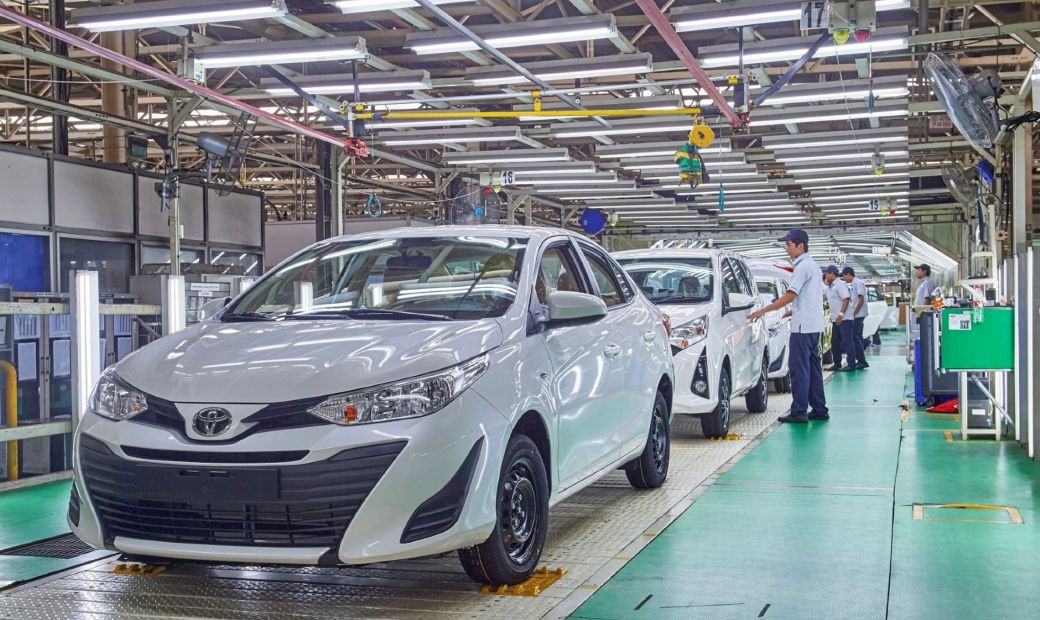Please fill in some of the data provided below to receive the latest Toyota-related news and information in your email.


Toyota Indonesia is recorded as the pioneer of automotive manufacturing in Indonesia. Up to present, it has an extensive supply chain and robust business ecosystem, allowing it to play a role in the national economy.
Toyota Indonesia engages at least around 300,000 workers in the upstream and downstream sides. In the upstream side, there are component producers from all tiers that supply components to the manufacturer and sales network.
Toyota Indonesia’s plants are capable of making completely built-up vehicles and engines based on environmentally-friendly technology. Apart from its capability to produce vehicles locally, it also dominates the domestic market. The position is enabled by the performance of its business partners in the downstream side. They comprise authorized dealers, such as Auto2000, Nasmoco and Kalla Toyota.
On the supply chain side, Toyota Indonesia cooperates with approximately 200 first-tier suppliers. Its robust business ecosystem and the extensive supply chain results from its sustainable industrial deepening.
At present the local content of products manufactured by Toyota Indonesia ranges from 75% to 94%. It means that 75% to 94% of Toyota vehicles are made of local components. The high level of the local content shows that it contributes to the growth of the national automotive industry. Apart from meeting the domestic demand, which is about 1.1 million units per year, Toyota Indonesia also develops export.
For instance, by holding a market share of nearly 50%, or around 500,000 units, Toyota helps put the brake on import. As a result, at the macro-economic level, Toyota Indonesia reduces pressure in the trade balance caused by import.
On the other hand, thanks to high local content, Toyota Indonesia’s export products serve as Indonesia’s ambassador at the international stage. Moreover, the export of Toyota’s completely-built up vehicles totaling 300,000 units, or almost 70% of the national export, gives Indonesia the opportunity to secure greater foreign exchange and link small and medium enterprises producing automotive components to export markets by way of articles used in Toyota vehicles or components.
In line with the development of its overseas network, Toyota Indonesia has also built an after-sales base. To put it simply, locally-made components are also shipped to various countries in Asia, Africa, Latin America and Australia.
The progress of the automotive industry, in which Toyota Indonesia is one of the drivers, increasingly has a greater role in the national economy. Referring to data from Central Statistic Agency (BPS), the manufacturing sector contributes on average 22.5% to the gross national product (GDP) that amounts to Rp 13,000 to Rp 14,000 trillion. Furthermore, the automotive industry, along with other industries, gives a share of around 28% to the manufacturing sector. The automotive industry and other industries, such as chemical and transportation industries, contribute 6% to the overall GDP, or Rp 780 to Rp 840 trillion, each year.
With the strength and the development of its supply chain and business ecosystem, Toyota Indonesia hints at its long-term commitment in Indonesia. It is present to strengthen the domestic industry and export in the future as the domestic automotive market is, based on statistics, predicted to further grow.
Based on estimates, the ratio of car ownership in Indonesia is 90 units for every 1,000 people with the assumption that its population has reached 250 million people.
The figure is still much lower compared to other Southeast Asian countries, such as Thailand with 233 vehicles for 1,000 people and Malaysia with 400 for 1,000 people. In other words, the Indonesian automotive market will potentially quadruple.
Strengthening the Foundation
Although Toyota Indonesia has carried out its manufacturing works in Indonesia more than four decades, it continues to conduct various coaching and development programs.
For decades, the company has sustainably localized its automotive component sourcing. In addition, it has also enhanced the quality of each local supplier to enable its products to meet international standard.
The result? Right now diverse Toyota products are acknowledged and taken by many countries.
Toyota Indonesia has traditionally held the program to develop and strengthen industrial foundation targeted at its partners of various tiers.
One of the phenomenal ones is Jishuken Toyota Production System (TPS). The annual program is a training that involves at least 200 first-tier suppliers, to be expanded to second and third-tier suppliers. It aims to transfer the expertise and skills from Toyota to its suppliers.
The capacity building of the suppliers is carried out through the transfer of skills, which prioritizes the development of reliable human resources who fulfill the global skills standards.
Jishuken TPS, which targets the first and second tier suppliers, is encouraged to be applied more widely. As designed by Toyota Indonesia, the knowledge and expertise of Jishuken TPS graduates can be further spread from first and second tier suppliers to their partners.
The core of the Jishuken TPS is similar to the meaning of the word. Jishuken is a combination of two Japanese words, Jishu and Kenkyu, which means independent investigation or the ability to investigate problems and plan, and conduct independent enhancement activities.
Toyota Indonesia, Industri Otomotif, Manufaktur Otomotif, Rantai Pasok
Media/Journalist Contact : [Memuat email...]
Non Media / Non Journalist Contact : [Memuat email...]

© 2024 Toyota Motor Manufacturing Indonesia. All Rights Reserved.
